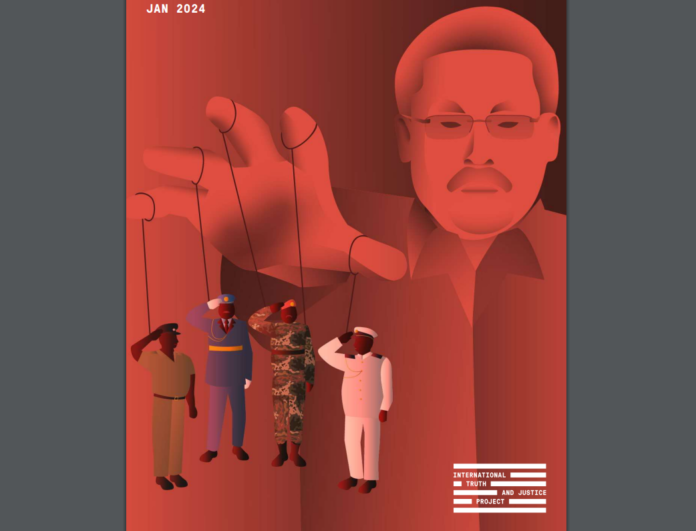This report is a sequel to the ITJP report of 2022 which examined Gotabaya Rajapaksa’s
alleged complicity in mass enforced disappearance in 1989 in Matale.2 Following that report, a group of UN experts wrote to the Government of Sri Lanka in 2022 asking what
action they had taken and, when there was no response, they made public their communication.3
The current Government of Sri Lanka’s proposal to establish a Truth Commission is of great
concern, since to date the government has not replied to the UN experts’ letter. Gotabaya
Rajapaksa is arguably the most notorious alleged perpetrator involved in both the violence of the late eighties and the civil war that ended in 2009, destroying the lives of Sinhalese and Tamils.
This second report makes the case that former Sri Lankan President Gotabaya Rajapaksa had command and superior responsibility for multiple violations of international humanitarian law and international criminal law amounting to war crimes and crimes against humanity committed during the final phase of the country’s civil war in 2009. These crimes include the deliberate and indiscriminate shelling of hospitals and civilian encampments, resulting in unlawful killings, torture and sexual violence, the planned enforced disappearance of hundreds of suspected combatants at the war-end, the deliberate starvation of civilians and the withholding of medication and objects necessary to their wellbeing, and the failure to investigate allegations of these violations, as well as the
This report presents detailed linkage evidence connecting former Defence Secretary Rajapaksa to orders given by him to commanders in the field. It shows he had contemporaneous knowledge of the violations of international humanitarian law and international criminal law that were being committed. He and successive Sri Lankan governments have had countless opportunities since the war-end to initiate credible investigations into allegations of gross human rights violations and to establish prosecutions. Instead of letting the truth to come to light, Gotabaya and his successors have perpetuated denial of the complicity of the security forces in these violations, in effect
rewarding and protecting the alleged perpetrators.
There is a direct line of impunity running from 1989 to 2009 and to the present day. As a young army commander in Matale District in 1989, Gotabaya Rajapaksa was in command and control when more than 700 people were disappeared under his watch. Both he and his subordinates from the period were promoted and went on to play pivotal roles in the 2009 conflict, with Shavendra Silva, for example, appointed as the current Chief of Defence Staff of the Sri Lankan Army.4
During the period 2015-2019, when the Rajapaksa family lost power, domestic court cases were initiated in Sri Lanka against Gotabaya Rajapaksa in connection mainly with economic
crimes and human rights abuses, but these were dropped when he was elected President in 2019.
The ITJP with the international law firm Public Designation, Due to Gross Violations of Human Rights, of Shavendra Silva of Sri Lanka Under Section 7031(c) of the Department of State, Foreign Operations, and Related Programs Appropriations Act, 14 Feb 2020, Hausfeld, in the United States, assisted eleven victims to file a civil claim in California
against Gotabaya Rajapaksa for damages for their torture. However, Gotabaya’s election
victory prevented the case continuing because he acquired head of state immunity. In 2022, Gotabaya Rajapaksa was forced from office by mass protests in Sri Lanka. He fled to the Maldives and then to Singapore, where the ITJP submitted a criminal complaint against him5 , and finally to Thailand before returning to Sri Lanka.
No attempt has yet been made in Sri Lanka to hold Gotabaya Rajapaksa accountable for alleged mass atrocities perpetrated by him either in 1989 or during the civil war. This dossier illustrates how strong a case there is to be made against Gotabaya Rajapaksa in his role as Secretary of Defence in 2009 in the commission of serious international crimes.
While Canada has sanctioned Gotabaya Rajapaksa,6 other countries should follow suit,
especially those who voted at the UN Human Rights Council for the establishment of an
independent mechanism for accountability for Sri Lanka.
Read the full report:Gotabaya-Rajapaksas-war-time-role-Jan-2024_Final_26.01.2024_compressed
2 https://itjpsl.com/reports/gotabaya-rajapaksa-the-srilankan-presidents-role-in-1989-mass-atrocities
3 Working Group on Enforced or Involuntary Disappearances;Working Group on Arbitrary Detention; Special Rapporteur on extrajudicial, summary or arbitrary executions and Special Rapporteur on the promotion of truth, justice, reparation and guarantees of nonrecurrence. Ref: AL LKA 3/2022 , 8 Nov 2022,
https://itjpsl.com/assets/DownLoadPublicCommunicationFi le.pdf
4 Shavendra Silva is designated in the United States for his alleged role in gross violations of human rights -unlawful abductions and detentions of opponents.
5.https://2017-2021.state.gov/public-designation-due-togross-violations-of-human-rights-of-shavendra-silva-ofsri-lanka-under-section-7031c-of-the-department-ofstate-foreign-operations-and-related-programsappropriations-a/ ITJP Dossier on Shavendra Silva at
https://itjpsl.com/reports/shavendra-silva
